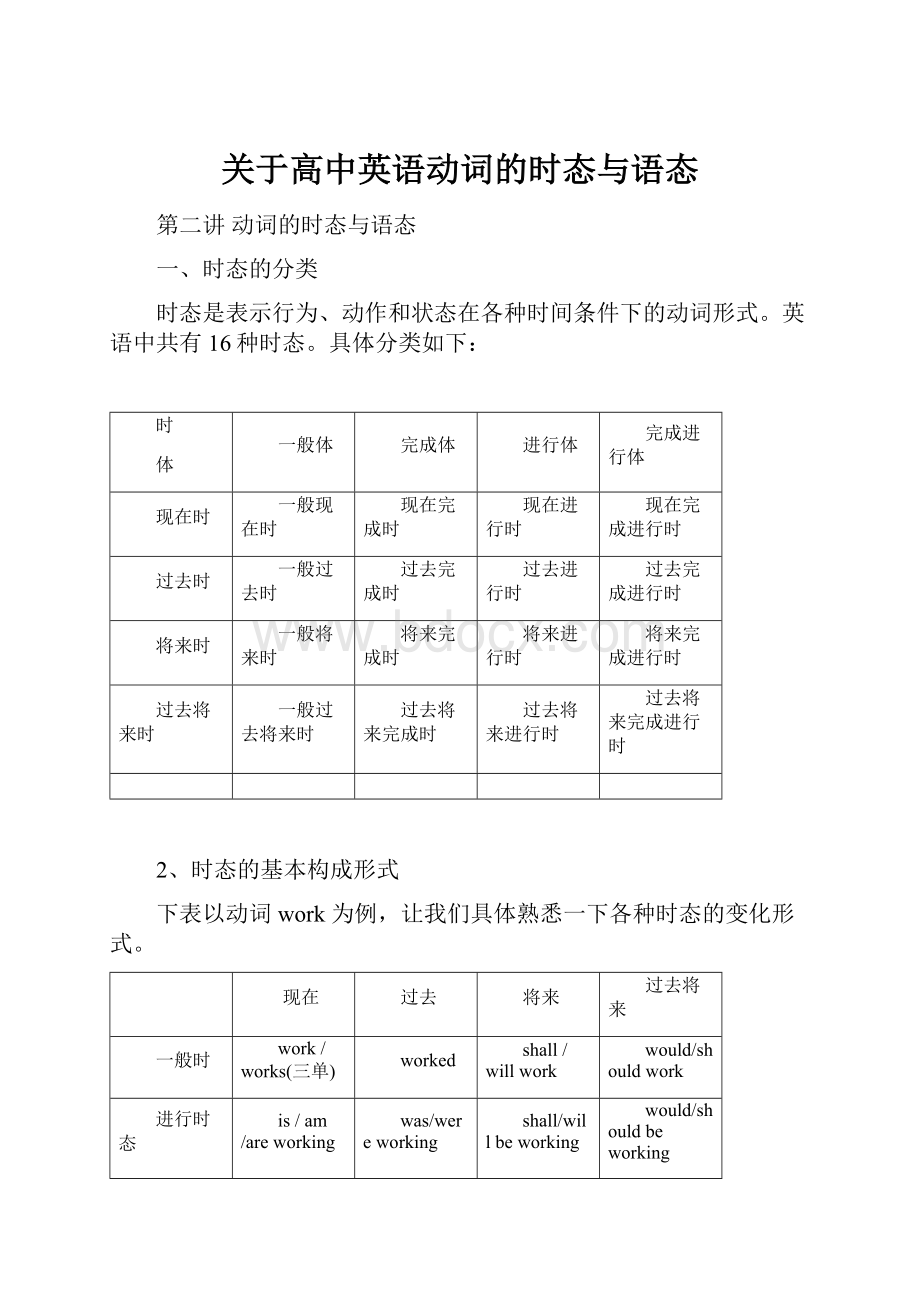关于高中英语动词的时态与语态.docx
《关于高中英语动词的时态与语态.docx》由会员分享,可在线阅读,更多相关《关于高中英语动词的时态与语态.docx(16页珍藏版)》请在冰豆网上搜索。

关于高中英语动词的时态与语态
第二讲动词的时态与语态
一、时态的分类
时态是表示行为、动作和状态在各种时间条件下的动词形式。
英语中共有16种时态。
具体分类如下:
时
体
一般体
完成体
进行体
完成进行体
现在时
一般现在时
现在完成时
现在进行时
现在完成进行时
过去时
一般过去时
过去完成时
过去进行时
过去完成进行时
将来时
一般将来时
将来完成时
将来进行时
将来完成进行时
过去将来时
一般过去将来时
过去将来完成时
过去将来进行时
过去将来完成进行时
2、时态的基本构成形式
下表以动词work为例,让我们具体熟悉一下各种时态的变化形式。
现在
过去
将来
过去将来
一般时
work/works(三单)
worked
shall/willwork
would/shouldwork
进行时态
is/am/areworking
was/wereworking
shall/willbeworking
would/shouldbeworking
完成时态
has/haveworked
hadworked
shall/willhaveworked
would/shouldhaveworked
完成进行时
has/havebeenworking
hadbeenworking
shall/willhavebeenworking
would/shouldhavebeenworking
三、常见时态的基本用法
1、一般体
(一般现在时、一般过去时、一般将来时和过去将来时)
1)一般现在时常考语法点
1))表示经常性、习惯性的动作
Wehavethreemealsaday.
Hegoestothecinematwiceamonth.
2))客观事实,客观真理,生活经验,格言及谚语
Knowledgeispower.
Themoonrunsaroundtheearth.
Sheoftentoldusthatpracticemakesperfect.
3))表示按时间表,计划、规定将要发生的动作。
常用于火车、轮船、飞机等定期定点运行的交通方式。
涉及到的动词有:
come,go,arrive,leave,start,begin,stop,return,move,plan等。
Thetrainarrivesat10:
30.There’splentyoftime.
OurtrainstartsfromXi’antomorrowandfinishesupinHuashanMountainthedayaftertomorrow.
4))在时间和条件状语从句中用一般现在时代替将来时
时间引导词:
themoment,theinstant,assoonas,when,until,before…
条件引导词:
if,once,unless,providedthat,onconditionthat,aslongas,providing
IwillgoshoppingwithyouthemomentIfinishmytask.
IwillborrowyouthebookonconditionthatyoureturnitonSunday.
5))3务必+3介意引导的宾语从句中一般现在时代替将来时
3务必:
make/besure/certainthat,seetoit保证,务必that
3介意:
mind,care,matter
Makesureallthewindowsareclosedwhenyouleavetheclassroom.
Actually,itdoesn’tmatterwetheryoumakeitornot.
6))themore,themore=the+形容词、副词比较级+主谓(一般时),the形容词、副词比较级+主谓(将来时)
Themoreknowledgeyoulearntoday,themoreimportantitwillbeforyouinthefuture.
2)一般过去时常考语法点
1))表示过去发生的动作或存在的状态
Theylivedherefortwentyyears.
Couldyoupleaserepeatyouraddress?
Ididn’tquitecatchit.
2))表示过去经常性或习惯性的动作,这时常与always,usually,often,sometimes,never等时间状语连用
Ineverdrankcoffee.
Ialwaysgotuplate,andneverhadenoughtimeforbreakfast.
3))usedtodosth过去常常做。
。
。
现在几乎或已经不做了
Get/beusedtodoingsth习惯于做。
。
。
beusedtodosth被用于做。
。
。
woulddosth过去常常做。
。
。
现在情况不明了
HeusedtogochurchonSunday.
Ihavebeenusedtoworkingearlysincelastyear.
3)一般将来时常考语法点
1))一般将来时用来表示将要发生的事情,英式英语中shall用于第一人称,will用于第二、三人称,美式英语中will可用于各种人称;shall用于第二、三人称后表达“允许,命令”口吻,而will表示意愿上的将来。
Ifyouwillwaitforme,Ishallcomebacksoon.
Everyoneshallbeseateduntilallofthetestpaperarehandedin.
2))一般将来时其他表示方法
1.begoingto和betodo
begoingto有两种意思:
一是表示个人主观打算做某事;
二是有迹象,要发生。
。
。
事
betodo表示客观上的将来,不以人的意识为转移。
Lookatthoseblackclouds.It’sgoingtorain.
Themeetingistobeheldat3o’clockthisafternoon.
2.begoingtodo与willdo
begoingtodo表示事先安排、计划好要做。
。
。
willdo表示临时决定做。
。
。
------Tomisinthehospital.
------Yes,Iheardofit.Iamgoingtovisithimtomorrow.(提前安排好的)
------Tomisinthehospital.
------Really?
Ididn’tknow.Iwillgoandvisithimtomorrow.(临时决定)
3.beabouttodo=soon即将发生,绝对不可以和任何确定的时间副词连用。
benotabouttodo=beunwillingtodo不情愿做。
。
。
Hurryup!
Thetrainisabouttostart.
Don’tgoout.Weareabouttohavedinner.
3))祈使句+and/or(结果不好的,相反的)+一般将来时
Studyhardandyouwillmakeitsoonerorlater.
4))位移动词用is/am/aredoing来代替将来时,这类词有come,go,arrive,leave,return,take,plan,open,begin,start等。
Thebusiscoming.
IamleavingHefeitomorrow.
5))onthepoint/verge/brink/eve+of….表示即将发生。
。
。
。
4)过去将来时
过去将来时表示从过去某一时间来看将要发生的动作或存在的状态。
这种时态常用于主句是一般过去时的宾语从句中,表示从句的动作发生在主句之后。
过去将来时同一般将来时类似,除了用woulddo表示外,也可以用begoingtodo,betodo,beabouttodo及过去进行时等表示方式
Hewassixty-eightandintwoyears,hewouldbeseventy.
Youweregoingtogivemeyouraddressbutyoudidn’t.
实战演练
1.ThefireofLondon_______onthenightofSeptember,1666.
A.wasbrokenoutB.hadbrokenoutC.brokeoutD.brokenout
4.Insomepartsoftheworld,tea_____withmilkandsugar.
A.isservingB.isservedC.servesD.served
5.Ifyou_____waitforme,IwillgoshoppingwithyouafterIfinishit.
A.canB.mayC.shallD.will
16.Hesteppedintotheoffice,_____downandbegantofillintheforms.
A.sittingB.tositC.satD.havingsat
21.—Sorry,Iforgottoposttheletterforyou.
—Nevermind,_____itmyselftonight.
A.I’mgoingtopostB.I’dbettertopost
C.I’llpostD.I’dratherpost
22.Eachmember_____beseatedbeforetheleaderleaves.
A.shallB.willC.canD.must
37.——Tomisinthehospital.
——Yes,Iheardofit.I_____visithimtomorrow.
A.willgotoB.amgoingtoC.amtogotoD.shallgoto
42.Heisverybusy.Idon’tknowifhe_______ornottomorrow.
A.comeB.comesC.willcomeD.iscoming
50.Thecomputersonthetable___ProfessorSmith.
A.belongs B.arebelongedto C.belongsto D.belongto
2.完成体
(现在完成时、过去完成时、将来完成时和过去将来完成时)
1)现在完成时
主要用来表示完成某事或过去发生的动作持续到现在。
常用的时间状语有:
allone’slife,allday,thewholeday,uptonow,sofar,inthepast/last+一段时间,since+时间点...,for+一段时间等。
1))表示说话之前已经完成的动作,常与already,yet,now,just,bythistime,sofar,bynow等时间状语连用。
Haveyoufinishedyourtaskyet?
Ihavetidiedupmyroomnow.
2))表示过去发生的某一动作一直持续到现在,而且还有可能会持续下去。
Howhaveyoubeenrecentlywithyourstudy?
Ihavebeeninthelibraryforawholemorning.
3))havebeento表示“去过某地”,是回来之后再讨论去过某地的情况
havegoneto表示“到某地去了”,人可能还在路上,也可能已经到达,但一定不在说话人这里。
4))现在完成时常与for/since搭配使用。
since+时间点;for+时间段;
其中since使用公式为:
havedone(85%)/havebeendoing(10%)/do(5%)+since+did(100%永久)
havedone+for+时间段(其中谓语动词必须是延续性动词,如live,work,keep,stay等)
Wehavebeenfriendssincehejoinedthearmy.
TheyhavebeenlivinginHefeiforseveralyears.
5))两种固定结构后接现在完成时
1)it/this/thatisthefirst/second...timethat+havedone
2)it/this/thatisthe最高级(most)+nthat+havedone
ItisthefirsttimethatIhavebeentoBeijing.
2)过去完成时
与现在完成时的用法相同,只是作为衡量标准的时间不同。
过去完成时是以过去某个时间作为衡量标准,表示过去发生在“过去的过去”,或动作持续到过去某一时间为止。
常用的时间状语有:
bytheendof,bythattime,since+从句(did),before+过去时间或从句(did),longbefore,when+从句(did)等。
Ihadjustfinishedhalfoftheworkbyyesterday.
Theroadswerefullofpeople,wehadn’tthoughtofthat.
1))当遇到“一。
。
。
就”结构时用haddone,一旦否定词至于句首,主谓需要采用部分倒装式。
1)…hardly/scarcely…haddonewhen/before…did
2)…nosooner…haddonethan…did
Theyhadhardlybegunwhentheyweretoldtostop.
Hehadnosoonerboughtthecarthanhesoldit.
Nosoonerhadhereturnedtohisowncountrythanheboughtafinehousethen.
2))在Itwasthefirsttimethat…中,从句的谓语动词要用过去完成时
ItwasthefirsttimethatwehadtriedSichuanfood.
3))用wish,expect,hope,mean,intend,suppose,plan,think,want等词的过去完成时可以表达“过去没有实现的愿望、打算、计划”,可指“失望、惋惜”等情绪。
Themotherhadplannedtotakehersontothezoo,butshejustcouldnotfindmine.
Wehadhopedthatyouwouldcomeandhelpus,butyoudidnot.
3)将来完成时
主要用于表示在将来某一时间点上会完成得动作,并对将来某一时间产生影响。
常与将来时间状语连用。
Weshallhavefulfilledtheworkbytheendofnextweek.
You’llsoonhaveforgottenallaboutit.
4)过去将来完成时
主要用于以过去某一时间点为参照,表示到这一时间点为止将会完成的动作。
Hetoldmehewouldhavelearned4000Englishwordsbytheendoflastmonth.
Ithoughtyouwouldhaveleftbythistime.
实战演练
12.Allthepreparationsforthetask_____,andwe’rereadytostart.
A.completedB.complete
C.hadbeencompletedD.havebeencompleted
14.He_____tothelabthanhesetouttodotheexperiment.
A.hadnosoonergotB.wassupposedto
C.willnosoonergetD.havenosoonergot
33.Scarcely____she____theroomwhenthephonerang.
A.had;enteredB.did;enterC./;enteredD./;hadentered
15.Themother_____totakehersontothezoo,butshejustcouldnotfindtime.
A.plannedB.wasplannedC.plansD.hadplanned
20.Lindahas1ostherpassportagain.It’sthesecondtimethis_____.
A.hashappenedB.hasbeenhappened
C.happenedD.Happens
36.Itwasthefirsttimethatwe____Sichuanfood.
A.tryB.aretryingC.hadtriedD.tried
29.Thestory______,andeverybodyknowsaboutit.
A.hasgotroundB.gotround
C.wasgotroundD.hasbeengotround
49.Thenewsuspensionbridge___bytheendoflastmonth.
A.hasbeendesigned B.hadbeendesignedC.wasdesigned D.wouldbedesigned
3.进行体
(现在进行时、过去进行时、将来进行时和过去将来进行时)
1)现在进行时
表示说话时正在进行的动作或存在的状态,常与now,rightnow,atthismoment,atpresent等时间状语连用。
It’ssnowinghardoutside.
Whataretheyquarrellingabout?
1))位移动词用is/am/aredoing来代替将来时,这类词有come,go,arrive,leave,return等。
Thebusiscoming.
IamleavingHefeitomorrow.
2))现在进行时与always,constantly,continually,forever(forever),usually等频度副词连用时,往往表示生气、不满、同情、赞美等情感而非动作正在进行。
Mybrotherisalwayslateforclass.
Sheisalwayshelpingotherswhentheyareintrouble.
2)过去进行时
表示过去某一时间正在进行的动作,此时句中往往有表示过去的时间状语then,atthatmoment,atthattime,atthetime,thistimeyesterday等。
没有时间状语时,需要根据上下文的语境体会。
Iwaswritingaletterwhenyouphoned.
Whatwereyoudoingthistimelastnight?
1))用于描写故事情景,或提供故事发生的时间背景。
也就是说描述一个动作正在进行时另一个动作突然发生。
Shewassittingatthewindow,watchingtheeveninginvadetheavenuewhensheheardsomeonecallingherfromdownstairs.Sherecognizedthevoiceandstoodupquickly.
2))与现在进行时相似,过去进行时也可与always,constantly,continually,forever(forever),usually等频度副词连用时,往往表示生气、不满、同情、赞美等情感
HewasalwaysringingmeupwhenIwasinLondon.
3)将来进行时与过去将来进行时用法类似,不做陈述。
实战演练
8.—Hey,lookwhereyouaregoing!
—Oh,I’mterriblysorry._____.
A.I’mnotnoticingB.1wasn’tnoticing
C.Ihaven’tnoticedD.Idon’tnotice
13.Tom______.
A.hasalwaysboastedB.alwaysboasts
C.isalwaysboastingD.doesalwaysboast
19.You____yourexamsthistimeinMarchnextyear.
A.will